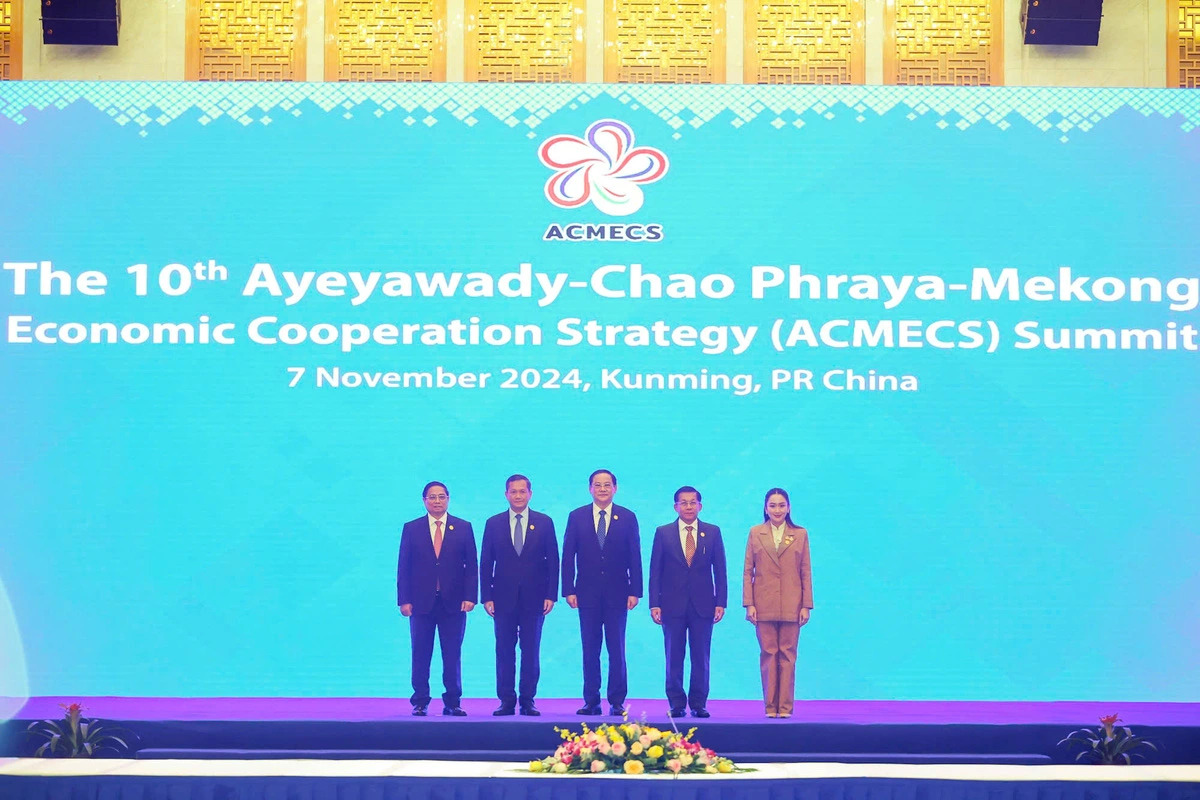Vietnamese Prime Minister Pham Minh Chinh has put forward six proposals for boosting the development of the cooperation mechanism Ayeyawady-Chao Phraya-Mekong Economic Cooperation Strategy (ACMECS) and announced Vietnam’s contribution of US$10 million to the ACMECS Development Fund.
On Thursday, PM Chinh pushed the proposals while attending the 10th ACMECS Summit, entitled ‘Towards Seamless Connectivity for Mekong Sub-regional Integration,' in Kunming City, Yunnan Province, China.
The ACMECS is an economic cooperation framework built by five countries: Cambodia, Laos, Myanmar, Thailand, and Vietnam.
The representatives meet annually under the overarching goal of ensuring peace, stability, and common prosperity.
During the 2024 summit, leaders from these countries emphasized ACMECS’s vital role in boosting socio-economic development in member countries, enhancing people’s life quality, narrowing development gaps, and promoting connectivity within ASEAN.
The leaders asserted that the complex and unpredictable global changes are presenting the Mekong sub-region and ACMECS cooperation with multi-dimensional challenges.
They called for a stronger cooperation mechanism to build an ACMECS community based on solidarity, strength, and sustainability.
All members agreed that ACMECS will continue to focus on enhancing transport connectivity, developing digital infrastructure, facilitating trade, and fostering high-quality human resources, digital transformation, and green transformation.
The summit also insisted on Mekong River water resources cooperation, with commitments to strengthen transboundary water management, share hydrological data, and establish an early disaster warning system.
Regarding ACMECS's central role in Mekong sub-regional cooperation as a key part of the ASEAN Community, PM Chinh stated that Vietnam will continue to actively and creatively contribute to the development of ACMECS, working toward building "a strong ACMECS for a united, diverse, and equally developed ASEAN."
The official said as the world is entering an era of innovation, ACMECS needs to define a new mission of building a unified, strong, and sustainable Mekong community based on a shared aspiration, vision, determination, voice, and action.
With the aim of promoting ACMECS cooperation in the future, PM Chinh put forth six proposals.
The first encourages ACMECS to adopt an action-oriented mindset and strengthen coordination to ensure that all cooperation plans and programs are substantive, focused, highly feasible, and match resource mobilization capabilities.
Along with this proposal, the Vietnamese government leader announced that Vietnam would contribute $10 million to the ACMECS Development Fund, which finances development projects under the ACMECS framework.
In his second proposal, Chinh underscored that ACMECS should combine tradition and modernity by supporting member countries to bring forward traditional growth drivers including investment, consumption, and trade, while promoting new growth momentum, such as digital transformation, in various economic sectors.
The third proposal states rapid growth must be linked with sustainability, urging the promotion of green transition, circular economy, and sharing economy, and calling for green finance for green industries, clean agriculture, and low-emission transportation to better respond to climate change.
In his fourth proposal, PM Chinh called for enhanced regional and international connectivity by developing both intra-regional and inter-regional transport infrastructure, particularly railway and expressway systems.
This would improve the flow of goods and services and facilitate cross-border movement of citizens from the founding five nations.
The fifth proposal emphasized the need for ACMECS to create effective connections between governments, people, and businesses.
It suggested that people and businesses should be at the heart of all ACMECS strategies, action plans, and projects, ensuring practical and inclusive benefits and guaranteeing that no one is left behind.
Lastly, PM Chinh emphasized in his sixth proposal the need to maintain stability and security in any development process.
He recommended that ACMECS expand cooperation in combating transnational crimes, particularly drug trafficking and cybercrime, and preventing criminals from using the territory of one country for acts against another.
The Vietnamese government chief’s proposals were highly appreciated by the summit and recorded in its official documents.
The summit wrapped up with the five nations’ leaders adopting the Vientiane Declaration and witnessing the handover of the ACMECS Chairmanship from Laos to Myanmar.
Like us on Facebook or follow us on Twitter to get the latest news about Vietnam!


















































